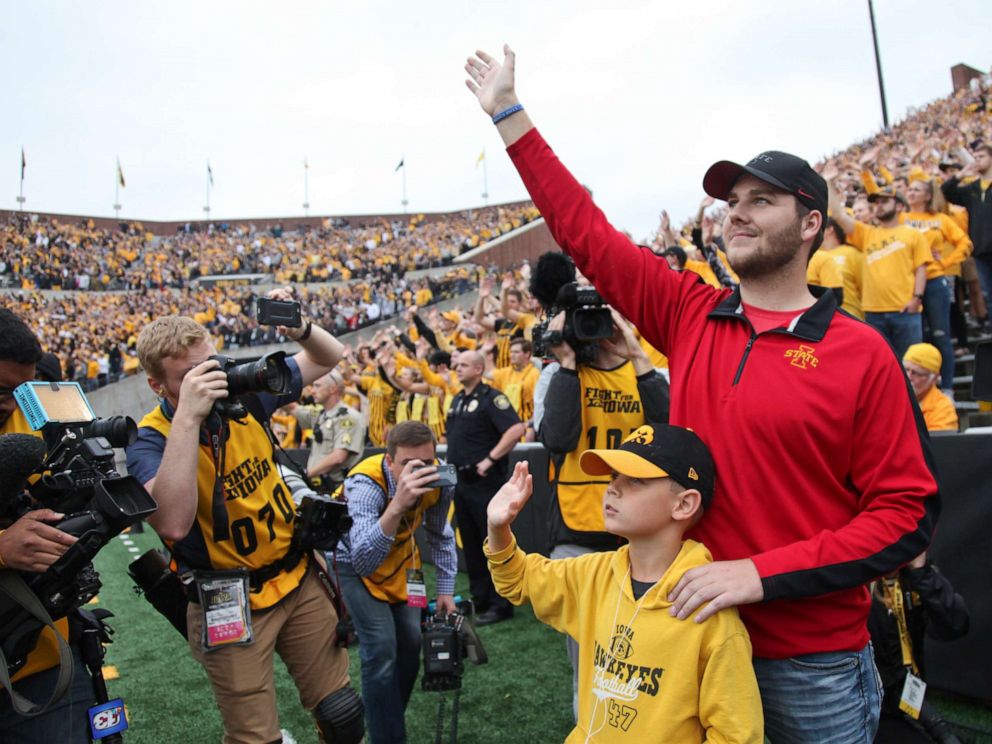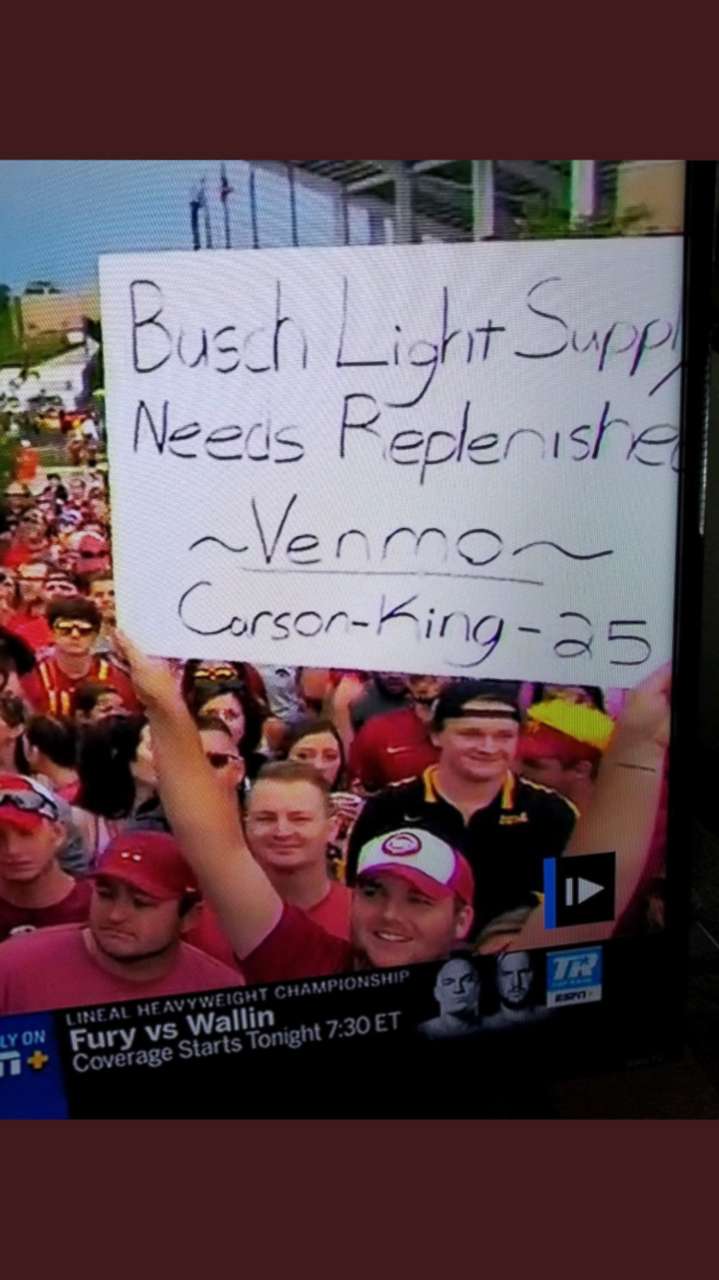Viral 'beer money' fundraiser erupts into racist tweets, a fired reporter and online drama
The young fundraiser discovered the downside of being in the public spotlight.
It all began with a handmade sign asking for beer money. It ended in resurfaced racist tweets, a young reporter losing his job and a round of apologies.
The drama began after it was discovered that Carson King, the 24-year-old whose sign reading "Busch Light Supply Needs Replenished" went viral after it appeared on ESPN's "College Game Day," had written some racist tweets as a teenager.
King, who's vowed to donate more than $1 million in "beer money" to a children's hospital, apologized. He was bashed online. Companies that jumped at the chance to help him have since backed away from him.
Then, Twitter users discovered that the reporter for The Des Moines Register who uncovered King's tweets, Aaron Calvin, had written a few questionable Twitter posts of his own. He was bashed online as well and ultimately lost his job with the newspaper. The reporter told ABC News that he feels he has been "unfairly cast" as a "bully and a villain" in all of this.
Online "cancel culture" gone awry, perhaps?
"A routine background check of King's social media revealed two racist jokes, one comparing black mothers to gorillas and another making light of black people killed in the holocaust. The joke tweets date back to 2012, when King was a 16-year-old high school student," reported The Register.
Yet much of the online backlash was not directed at King's old posts. Instead, Calvin and The Register received most of the social media ire.
The Register's executive editor Carol Hunter addressed the paper's decision to run King's past tweets in an opinion piece. "Register editors discussed at length whether to include information about the tweets and King’s remorse in our profile," she wrote.
"We ultimately decided to include a few paragraphs at the bottom of the story," about King's resurfaced tweets, she continued.
Hunter also said that the paper was "revising our policies and practices, including those that did not uncover our own reporter’s past inappropriate social media postings." As for Calvin, Hunter wrote that he "is no longer with the Register."
"When I discovered the racist tweets published by King in high school, I went to him and got a statement from him before including them at the end of an overwhelmingly positive profile that briefly addresses and contextualizes these tweets," Calvin said in an email to ABC News. "I did this with the full cooperation of my editorial supervisors at the Register. I performed my job as a journalist responsibly and treated King with respect and the benefit of the doubt as a subject."
He has received "many threats, some requesting I kill myself and others threatening to do the job themselves," Calvin said. "My former co-workers at the Register also received many death threats along with a tide of unearned anger."
"I would like to state that my former editors, although apologetic, approved of and were involved in the entire process of addressing King's social media history," he said.
Calvin said he apologizes for his past tweets. "Many of them are inappropriate and I wouldn't have published them today, though I contend that most were simply unfortunate, removed from context or the result of an attempt at ironic humor and by no means a meaningful reflection of my values."
Although he does not think it is fair that he was "publicly pushed" from his job, "I'm still a straight white man who has enjoyed a great deal of privilege in my life due to this fact of my birth and what I have suffered through this ordeal does not compare to what journalists who are women, LGBTQ, or people of color suffer on a much more routine basis," he said.
King has also made the apology rounds over his own controversial tweets.
"I am embarrassed and stunned to reflect on what I thought was funny when I was 16 years old. I want to sincerely apologize," he posted in a tweeted dated Sept. 24.
Social media "has the power to bring people together for the common good," but that “it can also make your life very public," King said during a press conference.
"That's why I wanted to share with you guys that eight years ago when I was a sophomore in high school I made some social media posts to my friends that quoted and referenced the show 'Tosh.0'.," he said.
He had no recollection of the posts, he said, but "in re-reading it today eight years later I see it was an attempt at humor that was offensive and hurtful," King said.
"I want to sincerely apologize. Thankfully, high school kids grow up and hopefully become responsible and caring adults," he continued. "I think my feelings are better summed up by a post [of mine] from three years ago, 'Until we as a people learn that racism and hate are learned behaviors, we won't get rid of it. Tolerance towards others is the first step,' that's from July 8, 2016," he said.

He said that he was "sharing this with you guys tonight because I feel [a] responsibility to all the people who've donated money to the cause," and that "I can't go back and improve and change what I posted when I was 16 years old, but I can apologize and work to improve myself every day and make a meaningful difference in people's lives."
He also said that he was "so very, very thankful for the generosity of the thousands and thousands of people who have donated and continue to donate for the Stead Family's Children's Hospital."
King told "Good Morning America," before the tweets had surfaced, that he was surprised his sign had gone viral.
"I thought it would just be a joke," King told said. "I didn't think anyone would actually see it."
Instead, donations began flooding King's Venmo account. On social media, he announced that after covering the cost of a case of Busch Lite beer, he would be donating the rest of the proceeds to the University of Iowa Stead Family Children's Hospital.
The news went viral and then both Busch Beer (the brand that also includes Busch Lite) and Venmo announced on Twitter that they would match King's donation. Shortly afterwards, King said he had raised $1 million as of Sept. 22. He has since raised $2 million, he posted in a recent Tweet.
King' apology post amassed 8,000 likes on Twitter and the responses appeared supporting and forgiving. However, Anheuser-Bush the maker of Busch beer, made it clear in an email to ABC News that it would no longer work with King.
"Carson King had multiple social media posts that do not align with our values as a brand or as a company and we will have no further association with him. We are honoring our commitment by donating more than $350,000 to the University of Iowa Hospitals and Clinics," said spokespeople for Anheuser-Busch in the statement.

Incidentally, organizers of a local Oktoberfest event in Iowa said they would not serve Busch Light after Anheuser-Busch's announcement about King, reported The Des Moines Register.
Venmo, which had also come out in public support for King's cause also released a statement. "Venmo's decision to match the money raised for the University of Iowa Stead Family Children's Hospital was inspired by the kindness of the entire Venmo community and their desire to support a worthy cause. Our intent has never changed, and we continue to honor our pledge to support the patients, families and staff members of the University of Iowa Hospital and Clinics," a Venmo spokesperson said in an email.
ABC News' Laura Laughead contributed to this report




